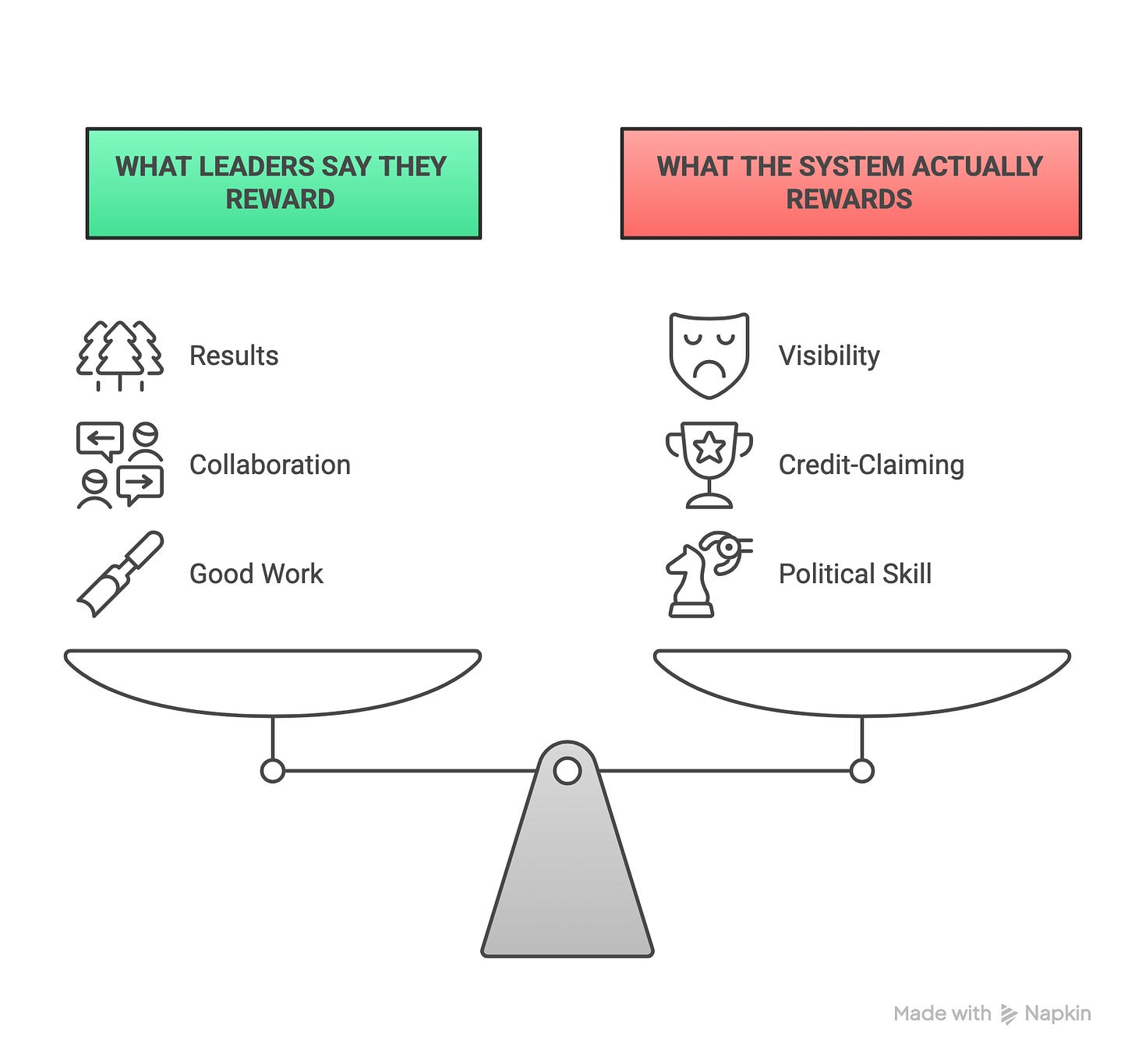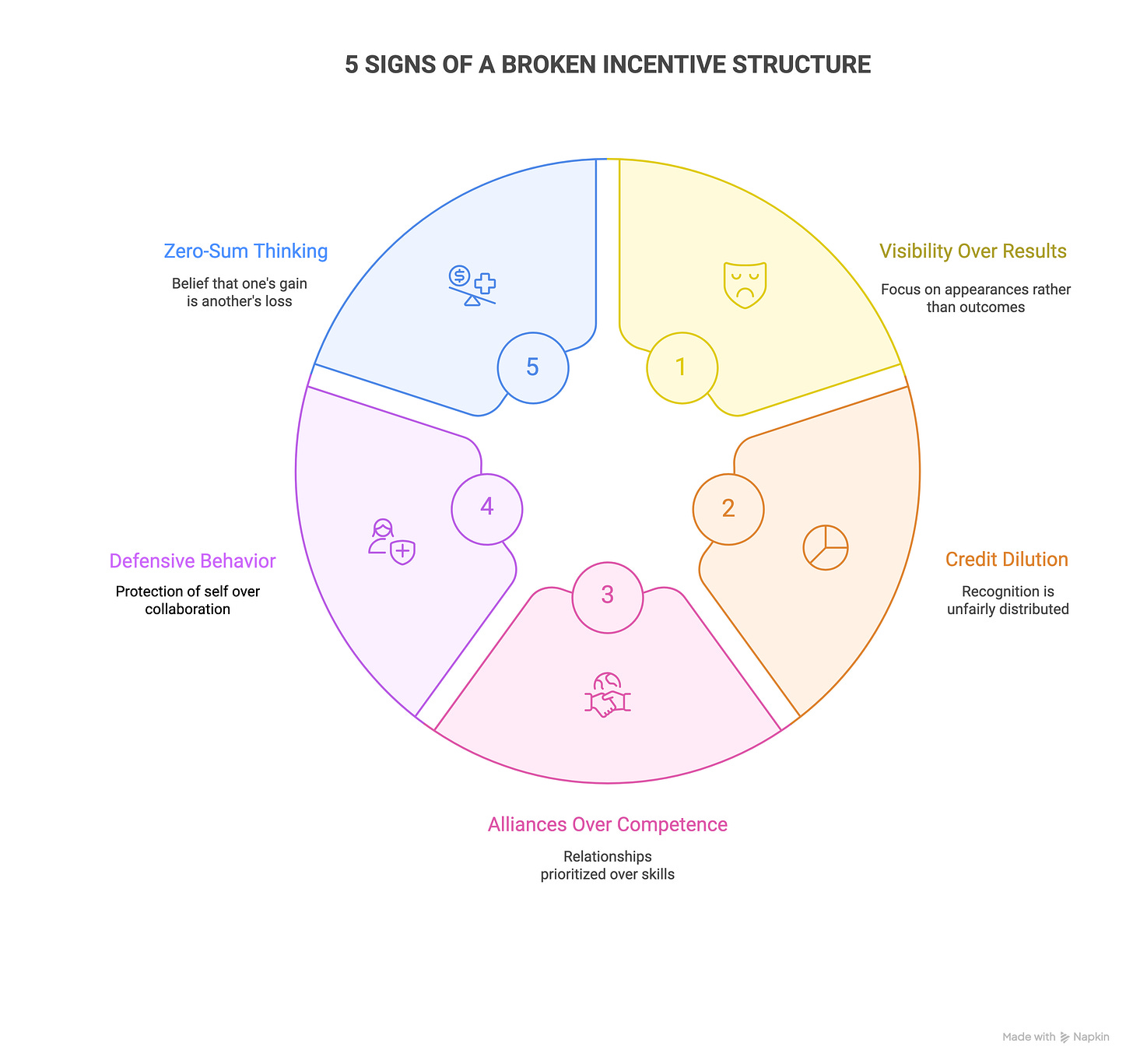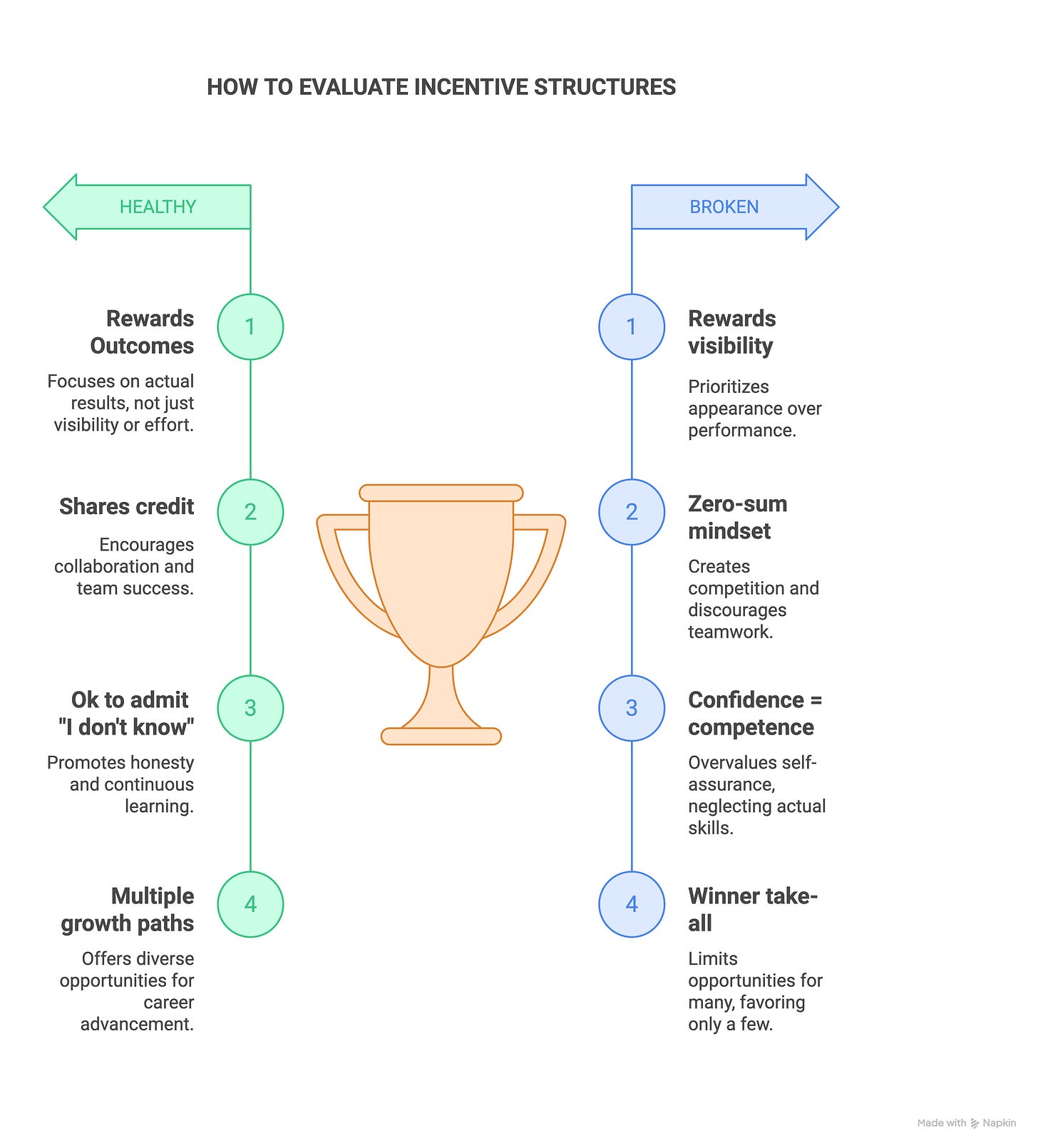When Good Work Can't Win
How to recognize and navigate organizations where politics matter more than performance
Ethan Evans wrote something recently about office politics that got me thinking. He said most of what we call “politics” is actually just people defending their emotional investment in their work. When your goal threatens someone else’s, they hear: “What you’ve been working on doesn’t matter.”
That resonated with a lot of people. But one comment went deeper.
One commenter Victoria said their frustration wasn’t just about people being emotionally invested in their projects. It was about people actively pursuing personal agendas and advancement at the expense of what’s right for the business and customers. “I want to grow the business” conflicted with “I want to advance my personal agenda.” “I want to do what’s right for customers” conflicted with “I want to look good to my boss.”
Then she added another layer: “There’s not enough space for everyone here, so I’ve got to make sure my chances are safe even if it means harming others to get there.”
That’s the real problem. Advancement opportunities are scarce.
Not everyone who wants to be a senior leader can become one.
Not everyone who wants it deserves to be one.
And when individual advancement incentives conflict with what’s right for the business, some people will actively undermine others to look good by comparison.
I don’t think most people are consciously thinking “I’ll harm others to get ahead.” They’re thinking things like “I need to make my work visible” or “I need to protect my reputation” or “I need to make sure I get credit for this.” But in a system where advancement is scarce, these defensive moves can undermine others.
I’ve seen this pattern play out across companies. Someone gets publicly supported but privately undermined. Resources get withheld. Credit gets redirected. And when the person can’t deliver without the support they were promised, they’re blamed for the failure - not the people who set them up to fail.
The company can’t tell the difference between someone who’s actually underperforming and someone who’s been made to look incompetent by others.
So what do you do when you’re in this situation?
I’ve thought about this a lot. Here’s what I’ve learned.
See It Clearly First
You can’t navigate what you can’t see. The first step is recognizing you’re in a broken incentive structure.
Here are the signs:
Visibility matters more than results. People spend more time promoting their work than doing good work. Whoever tells the best story wins, regardless of actual impact. Leadership rewards the person who “owns the narrative,” even when they did not deliver the outcome.
Credit gets stolen or diluted. Your ideas get repackaged as someone else’s. Others take credit for work you did, and when you point it out, you’re told you’re told you’re territorial or not a team player.
Alliances matter more than competence. Who you know matters more than what you deliver. Political savvy beats technical excellence. The person who manages up wins over the person who executes well.
Defensive behavior is normalized. People hoard information to stay valuable. Collaboration feels risky because someone might take credit. Helping others feels like weakening one’s own position.
Zero-sum thinking dominates. Someone else’s win feels like your loss. Promotions create resentment instead of inspiration. Success is seen as limited, not expandable. The pie is fixed, and everyone’s fighting for their slice.
Here’s the critical question: Is this just normal organizational friction, or is the incentive structure fundamentally broken?
Here’s how to tell:
In normal friction, you see occasional conflicts, but good work generally wins over time. People who deliver get recognized. Collaboration is rewarded. Mistakes are learning opportunities.
In a broken system, you consistently see incompetent people advance while competent people stall or leave. Politics matter more than performance. The people getting promoted are the ones you don’t respect. And the people you do respect are either leaving or becoming cynical.
Once you see it clearly, you can make strategic choices instead of just reacting.
If You’re A Leader, This Should Worry You
When your incentive structure rewards undermining behavior, you lose your best people. They leave. And you’re left with people who are good at politics, not necessarily good at their work.
Here’s what a broken evaluation looks like:
You’re rewarding visibility over impact. Promotions go to people who are good at self-promotion. Quiet, effective contributors get overlooked. The person who talks about the work gets credit over the person who does it.
You’re making credit zero-sum. Only one person can “own” a win. Team success gets attributed to whoever managed up best. Collaboration becomes risky because someone will take the credit.
You’re conflating confidence with competence. The person who sounds most certain wins. Thoughtful responses like “I don’t know, let me investigate” get punished. Admitting mistakes equals career damage.
So what does good evaluation actually require?
Make credit non-zero-sum. Multiple people can win from the same success. Explicitly credit collaboration, not just individual heroics. Ask yourself and your leadership team: “Who else contributed to this that I’m not seeing?” Make it a regular practice.
Evaluate based on outcomes, not narrative. Look at what actually happened, not who told the best story about it. Track results over time, not just who spoke up in the meeting. Get input from multiple peers and reports including skips. The person doing the work often sees things leadership doesn’t.
Reward collaboration over competition. Explicitly recognize people who make others better. Penalize credit-stealing and undermining when you see it. Make helping others a path to advancement, not a risk to your own career.
Expand the pie. Create more paths to advancement. Offer lateral moves with prestige and compensation. Don’t make every ambitious person compete for the same three VP slots. Recognize that not everyone wants to manage, but everyone wants to grow.
Here’s the hard truth for leaders: If your incentive structure is broken, your best people are already looking for the exit. And the people who stay? They’re optimizing for the game you’re actually rewarding, not the one you think you designed.
Your Actual Options If You’re Experiencing This
If you’re on the receiving end of this, here are your real options. I’m not going to sugarcoat it. None of them are great.
You can fight back politically. This means managing up aggressively. Making your work visible constantly. Building alliances with powerful people. Defending your territory. Maybe even undermining the people who are undermining you (if you’re willing to go there.) The cost? It’s exhausting. It’s soul-crushing if you hate politics. It requires skills you may not have or want to develop. You might become what you hate. And even if you win, you’re still in a broken system.
You can build stronger alliances earlier. Cultivate advocates who know your work. Have people in your corner before the attacks start. Build relationships with leadership. Create visibility proactively, not reactively. This might work because it’s harder to undermine someone with strong advocates. Leadership hears the truth from people they trust. You’re not defenseless.
But it might not work because it still requires political savvy and time. If the system is truly broken, alliances may not matter. You’re still playing the game.
You can document everything. Track your contributions obsessively. Save receipts on who did what. Have evidence when credit gets stolen. Build a paper trail. This might work because it’s harder for people to gaslight you. You have proof if you need to escalate. It protects against blatant lies.
But here’s why this often doesn’t work: In political environments, perception matters more than documentation. Leadership often doesn’t want to dig into “he said, she said” situations. And honestly? Documenting everything can make you look defensive even when you’re right.
You can leave before it gets worse. Find another role before the damage spreads. Exit while your reputation is still intact. Cut your losses. This might be the right move because some systems are too broken to fix from inside. Your mental health and career trajectory matter. You can’t win a rigged game.
But it feels wrong because it feels like quitting. It feels like letting the bad actors win. You wanted to succeed here.
Here’s the reality: Sometimes there’s no good answer. You can try to fight, document, build alliances. But if the incentive structure fundamentally rewards undermining behavior, the person who refuses to play that game often loses.
The Hard Truth: Sometimes The Right Move Is To Leave
Most career advice says: “Don’t quit. Fight harder. Be more strategic. Build better relationships.”
But sometimes the system is so broken that staying is losing.
How do you know?
Ask yourself these questions:
Is good work rewarded here, or is political skill rewarded?
When you look at who’s been promoted in the last year, are they people you respect for their competence or their ability to play politics?
When you look at who’s advanced, do you want to become them? Not just in terms of title, but in terms of how they got there and who they had to become to do it?
Are you becoming someone you don’t want to be in order to survive here? Are you doing things that violate your values? Are you lying awake at night thinking about work politics instead of the actual work?
Is the cost of staying higher than the cost of leaving? Not just financially, but emotionally, mentally, professionally?
If good work can’t win, you’re not in a meritocracy. You’re in a political system. And if you’re not good at politics, or you’re not willing to play that game, you will lose.
That’s not a character flaw. It’s strategic clarity.
The question isn’t “Am I tough enough to stay?”
The question is: “Am I in a system where good work can win, or where good work gets punished?”
If it’s the latter, leaving isn’t failure. It’s refusing to optimize for a game you don’t want to win.
Some battles aren’t worth fighting. Some systems are too broken to fix from inside. And recognizing that isn’t weakness. It’s wisdom.
So ask yourself:
Have you seen good work rewarded here in the last year? Not just praised, but actually rewarded with advancement, compensation, opportunity?
Do you trust leadership to evaluate fairly? Do they have the information they need? Do they care about getting it right?
Are the people advancing the people you’d want to become? Would you be proud to follow their path?
If the answer is no, you already know what to do.
I don’t have a neat framework for this. I don’t have a three-step process. What I can offer is a clearer lens for evaluating whether you’re in a system that can be fixed, or one you need to leave.
Sometimes the most strategic thing you can do is walk away.
What are the signs that tell you a system is fixable vs. one you need to leave?




